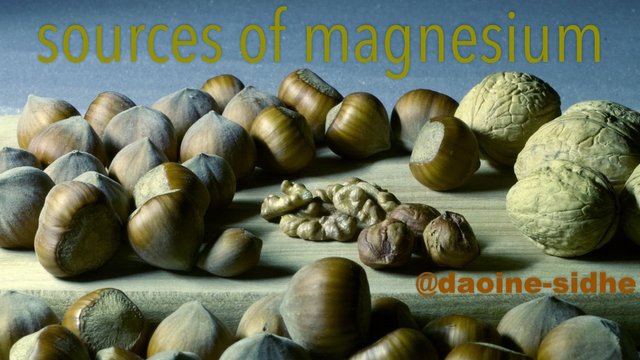MAGNESIUM : voluntary steemplicity : part 10 :

I don't take many supplements because I believe in consuming whole-foods. Nutrients in isolation lack the accompanying enzymes found in the nutrient's original food source. But there is one nutrient I do supplement in isolation: magnesium. The reason? Because my diet is so heavily biased toward calcium.
I love dairy, cheese in particular, and I think it's fair to say that cheese is an ingredient in almost every meal I eat! Of course, cheese is high in calcium. So is the milk and cream cheese I often cook with (though I'm not a huge fan of drinking it), as well as the sour cream I dollop on Mexican food. Even the occasional cocktail sipped in the evening is made better with some extra-sharp Welsh cheddar cheese.
And calcium is good for us, right? Keeps our bones strong and healthy. But a person can get too much calcium. Magnesium is an antagonist for calcium, and the two work together keeping each other in balance (much like sodium and potassium do).
And even though I'm a chocolate lover, my diet isn't high in magnesium. The foods highest in magnesium include nuts (especially almonds), avocado, and spinach. I don't tend to dollop any high-magnesium foods regularly. So I was likely top-heavy on calcium. And that can be a bad thing.

Magnesium is necessary for efficient metabolism. A study in Diabetes Care found that magnesium can reduce systemic inflammation in older women. Other studies suggest magnesium has an inverse association with metabolic syndrome.
Calcium is involved in the contraction of muscles. This is why too much calcium can result in muscle spasms. Magnesium is involved in the relaxation of muscles. You don't want either mineral to dominate. Instead, you want a balance so you have strong muscle contraction and easy muscle relaxation.
But according to Dr. Carolyn Dean, when calcium dominates, the worst possible scenario is that the heart muscle can be prone to the ultimate muscle contraction, a heart attack. This news resonated with me as I recalled that about 10 years ago I heard on the news that women had skyrocketing rates of heart disease. I remember at the time wondering what could be causing that? Looking back, I'm now wondering if it's the love affair women have with calcium supplements.
In the 1960s, women were told to fear osteoporosis. Coincidentally, as documented by H. Benninga, a new formulation of calcium supplement was developed around this time for the treatment of osteoporosis. And in their rush to prevent this disease with calcium supplements, they may have been causing another.
And so, I began supplementing with ionic magnesium in liquid form. The first thing I noticed was that my mood was elevated. Not at bad side effect at all. I can also tell that my muscles are more willing to let go of held tension, though I still need to consciously attempt that “letting go.”
Again, never overdo supplementation of anything. The last thing you'd want is to swing the other way on the pendulum, creating magnesium dominance at the expense of your calcium levels.